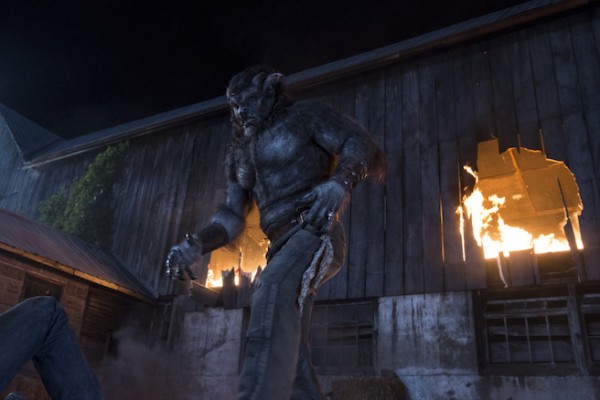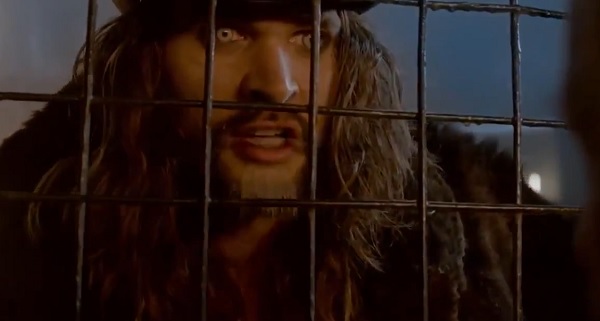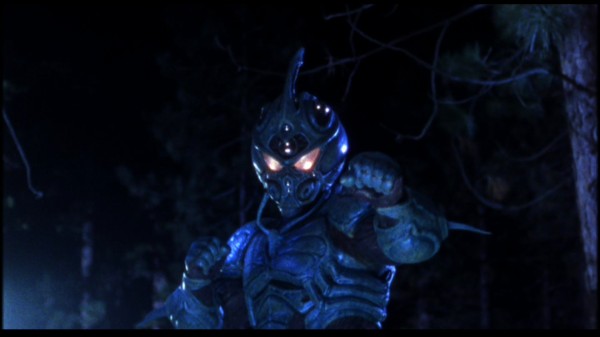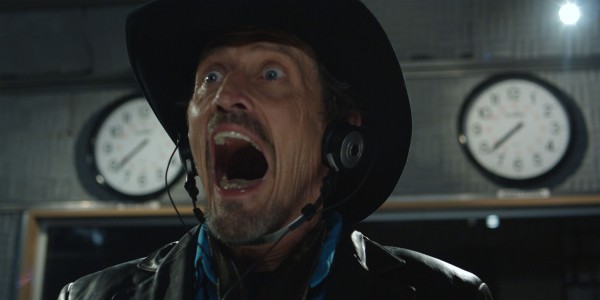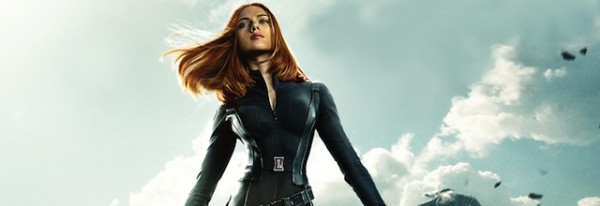David Hayter humored me. The man wrote two X-Men films (two good ones) and Watchmen, but he patiently answered not one, but two questions about his starring role in The Guyver 2: Dark Hero, a kaiju-superhero film that I happen to be a huge fan of. And for that, he has my unending respect.
We got together on the occasion of David’s directorial debut, Wolves. It stars Lucas Till (Havok in X-Men: Days of Future Past), Jason Momoa (Game of Thrones) and Canadian treasure, Stephen McHattie (Pontypool). It’s a lot of fun. A werewolf flees a crime scene in a letterman jacket. Like I said: fun.
The film comes out this Thursday (October 16th) on VOD and in select theaters on November 14th. If you like practical effects, people transforming into werewolves during sex and motorcycle-bike-riding (inside joke!), you’re going to love this. Without further ado…
CHUD: I have to start by saying what a huge fan I am of Guyver 2: Dark Hero.
David Hayter: (Laughs) Yeah?
CHUD: It’s a hugely entertaining movie and—maybe it’s just the werewolves fighting—there seems to be some connective tissue between that film and Wolves.
DH: Yeah, totally. I mean the big prosthetic creatures going at each other I guess had a pretty profound impact on me back in the day when I was The Guyver.
CHUD: Wolves, to me, played a lot like a superhero movie—or maybe even like a superhero origin story for the Cayden character who discovers he has these “powers.”
DH: Primarily because I came up as a superhero screenwriter, I feel like everybody has powers. So for example, if you’re doing The Verdict, then your character has “lawyer powers.” If you’re doing a detective film, they have detective powers. I would say in my friend Bryan Singer’s film, Apt Pupil, at the end, the boy uses his newfound Nazi powers to get out of trouble. So yeah, I think everybody’s got powers and—yeah, that was exactly what I wanted to do—I feel like there’s been 7,000 werewolf films where somebody faces these creatures and they’re just terrible, insane monsters and I wanted to do something that was a little different and a little more applicable to my life. You know, I went through a pretty wild period in my life when I was that age and I learned that—instead of destroying that part of myself—I learned to control it and to focus it into a more positive arena. I felt like that was not a direction that these films had taken before and I wanted to see if it could work.
CHUD: So empathizing with monsters is something that’s personal to you?
DH: Yeah, totally. I had a couple of times where I’d be called in front of the principal for fighting or whatever and they’d treat me like a monster and that really had quite an effect on me. I would say it’s kind of funny, but the film is semi-autobiographical. Mostly the part about me beating up football players.
CHUD: There’s no better creature to explore the nature of uncontrolled instincts than the werewolf anyway…
DH: Exactly. And that was the other side of it that I really wanted to explore. Wolves are not insane, out of control creatures. They’re beautiful, intelligent, sleek creatures with a very defined hierarchy to them and very keen instincts. I feel like they’ve been sort of short changed in modern cinema and I thought we could do something that would pay a little more tribute to that animal, rather than malign it.
CHUD: And the werewolf is sadly underutilized in the genre right now. There aren’t a lot of monster movies with the kind of practical make-up effects that you’ve used here and I loved seeing Jason Mamoa completely “wolfed out.”
DH: Well, and because we did everything in camera and practically, you would stand next to him and he’d be a six-foot, seven-inch, two hundred and fifty pound monster, you know? It was real. He obviously brought a lot of presence to the role.
CHUD: He also has this insane charisma that you sometimes see in other people of his stature. Most of those guys are MMA fighters or wrestlers, so there’s a certain amount of playing to the back row of the audience going on, but Jason has more of an effortless cool.
DH: Yeah, he’s a badass. He’s just incredibly, inherently charismatic and a phenomenal actor. I knew he was a good actor from Game of Thrones, but he blew me away on set. And it;s like he’s part-wolf to begin with. He went and studied at a wolf rescue and then he came to me and—you can’t see the hand gestures I’m about to do, but—he goes, “okay, this is what I learned. I see you, I see around you and I see through you.” And that’s what he brought to it. You just watch him in his human form and he just walks like a wolf and watches like a wolf. I’m just so impressed by him, I think he’s amazing.
CHUD: It’s interesting that you say that about the way he uses his eyes, because I noticed him doing something that Arnold (Schwarzenegger) does in The Terminator, where his body language follows his line of sight.
DH: Yeah, so the moment when Cayden (Lucas Till) first walks in and (Momoa) is joking with his savage pack before he senses him, you just see his eyes land on him. His focus is just electric.
CHUD: And he’s already got those great eyes, so when you put the contacts in, it makes them look even crazier.
DH: Well that’s the thing. I showed him all of these beautiful different contacts that would replicate how spectacular wolf eyes really are. So we’d come up with this ice-blue eye color for him and said, “well if that’s what it is, I want to have those contacts in all the time.” Now, I would never ask a man that large to wear contacts throughout an entire performance, but fortunately, he volunteered and it just gave him this incredible look. Plus, we were having him play older than he is, so he was like, “let’s put some grey in my hair and my beard.” So we did him up and he just has this incredible look to him and so far the woman have been very appreciative.
CHUD: Well there’s another potential Guyver connection there too! Were you in the prosthetics often enough to want to empathize with your actors and want to keep them out of the make-up chair whenever possible?
DH: I don’t want to burst your bubble, but the Guyver fight actors were all between six inches and a foot shorter than me because I’m 6’1”. So if I put on the suit it didn’t make the creatures look as impressive. So the only time I’m wearing it is when I turn back to Corey after her fly father has run off and they pull the mask off of me. And there’s one other sequence where I’m kind of strung up and covered in slime and the armor is flying on to me. Though I have had that experience, I have done prosthetic work,but never to the extent that poor Jason (Momoa) and Lucas (Till) and Merritt (Patterson) and John Piper Fergusson had to go through. Those suits—like, it was freezing outside when we shot it and Jason would still have to carry around a cooler that plugged into his suit and ran ice water all up and down his body. Otherwise, he’d just sweat out completely. It’s really brutal and they’d sometimes have to do it for up to 12 or 14 hours at a time. It’s a tough thing to put an actor through, so I do empathize with them but fortunately have not had to do too much of that myself.
CHUD: I also love that characters retain their hairstyles through the werewolf transformation. Like, Jason still has his samurai top knot after he transforms.
DH: Yeah, that was something that was important to me for some reason. We already have a certain amount for fur as human beings and that shouldn’t go away, it should just be enhanced. But then when we cast Lucas, he’s so blonde, we kind of ended up with this sandy-werewolf, which we never really intended, but I think it works out and it’s kind of fun. I do love seeing his actual hair recreated on the wolf.
CHUD: I was also excited to see Jason get to play against Stephen McHattie, because there are not many people who are physically imposing as Jason is, but Stephen has this level of intensity that allows him to stand toe-to-toe with him. What was it like working with him?
DH: It’s primarily a Canadian film—I’m a dual citizen—so, we had to hire mostly Canadian actors aside from Lucas and Jason. My former talent agent—from when I was an actor when I was 20 in Toronto—is Stephen McHattie’s agent now, and so she called up and said, “well what about Stephen?” I loved him in Watchmen, I thought he was incredible as Hollis Mason (Night Owl), so as soon as she brought him up, I knew that’s who it should be. And so he came on set and, yeah, he’s not a big dude. He’s a skinny guy and not terribly tall, but he’s terrifying. The cast and crew were very respectful around him and it took about three days for me to bond with him—I mean, he’s always a consummate professional—but I think I made him laugh on the third day and that was a big turning point. There’s that scene in the barn between he and Jason and, you know, Jason’s got no choice but to respect him because he’s just so bad ass! I had written in to the script that Tollerman (McHattie) was rattled at seeing Conor (Momoa) there and that he was a little fearful of him and then I realized while watching them do it, this guy isn’t fearful of anything. He’s respectful of Conor’s power, but at the same time, if he had to fight him to the death, he would do it and you could see that in his eyes. I mean, Stephen is just a phenomenon.
CHUD: I love that moment that they have at the farm where Jason challenges Stephen, saying something to the effect of, maybe your eyes aren’t as good as they used to be, and Stephen plays it so cool. He doesn’t back down in a really subtle way.
DH: All he does, is just sort of shrugs and says, “we’ll see. We’ll see how good my eyes are.” Yeah, that moment gave me chills. That’s when I felt like we might have a movie.
CHUD: I know this is your first feature as a director and you have a lot of writing credits, acting credits, etc. Was there anything about stepping into the director’s chair that made you appreciate the way other directors may have altered your scripts in the past?
DH: Did I go through a lot of people doing horrible things to my screenplays? Yeah. But I was lucky enough to be sort of trained and mentored by Bryan Singer, and he gave me such an insight on what it takes to make a film. Like, what you need to do to a screenplay to make it “shootable.” So I understood those things, but I didn’t always agree with what the studio were doing to the material. So while there things I had to change in my script to accommodate the rigors of production, I was able to make those decision in ways that i felt good about and wasn’t forced too many times—I mean, you’re always going to make compromises—but for the most part, I was able to come up with I thought was the coolest solution to the problem.
CHUD: Did it feel in any way like you’re working on another draft of the screenplay as you go through the production and then into the final edit?
DH: Yeah, I mean, it’s a cliche but it’s true: your film is written three times. It’s written on the page, it’s written on the set and it’s written during editing. I’m very extensively involved in the editing and all the way through you’re tweaking it, changing it, honing it, putting in voiceover, re-writing, re-recording lines. There’s just a constant re-write process, but I feel like if your structure is tight, you should be honing in on the film that you want before you start shooting and I think we did that.
CHUD: And finally, I know there was a time when you were working on a Black Widow script that you were also attached to direct. Do you feel like your script would have worked with the casting and some of the places they’ve taken the character in these other films, or would your take have been drastically different?
DH: I designed it to be an origin story that was universal, that everybody could appreciate and I don’t think they’ve done anything—certainly not with the casting, I think Scarlett (Johansson) is a superstar and I think she can handle just about anything—really, my goal was to create a character that was true to the comic books, feels human to us and the causes us to care about her journey given the horrible, horrible obstacles she faces in becoming a woman. I think it all still fits.
